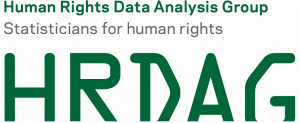Our Thoughts on #metoo
 This post has been co-authored by Megan Price, Patrick Ball, Christine Grillo and Suzanne Nathans.
This post has been co-authored by Megan Price, Patrick Ball, Christine Grillo and Suzanne Nathans.
Violence against women in all its forms is a human rights violation. Most of our HRDAG colleagues are women, and for us, unfortunately, recent campaigns such as #metoo (created 10 years ago by activist Tarana Burke), and the ongoing revelations about colleagues in our technical community who have assaulted women, are unsurprising. Sexual harassment and assault have been sad facts of life for many—or most—women around the world. It’s a fact for some men as well.
As data scientists, we are heartened to see this truth coming into the light after having been ignored or invisible for so long. Perhaps the violence will be countable, becoming data, so that we can use it to measure and guide accountability and reform.
What we do at HRDAG is count. We analyze trends in data as a way of learning something and discerning patterns, and then we use that analysis to make a case for justice and change. We use that analysis to help people understand the way the world works for people they’ve never met or spoken with about the violence in their lives.
For those who are learning something about sexual violence this month, we invite you to look for the truth, to see the clues, to keep a count and speak out—”Hey, that’s not cool” or “Hey, back off” are a good place to start—when violence unfolds in front of you. For those of you who are hearing your own truth confirmed, we hear you.
And as data scientists, we are acutely aware that the stories we hear are only a fraction of the stories that have been suffered. We use statistics (rather than accounting) to analyze patterns precisely because we need to include the voices that have been silenced by fear, by trauma, by exclusion, or simply by exhaustion. We want to include the full range of people who suffer violence so our solutions can include them along with those able to make their voices heard.
Thank you to everyone who is speaking and to everyone who is listening.
